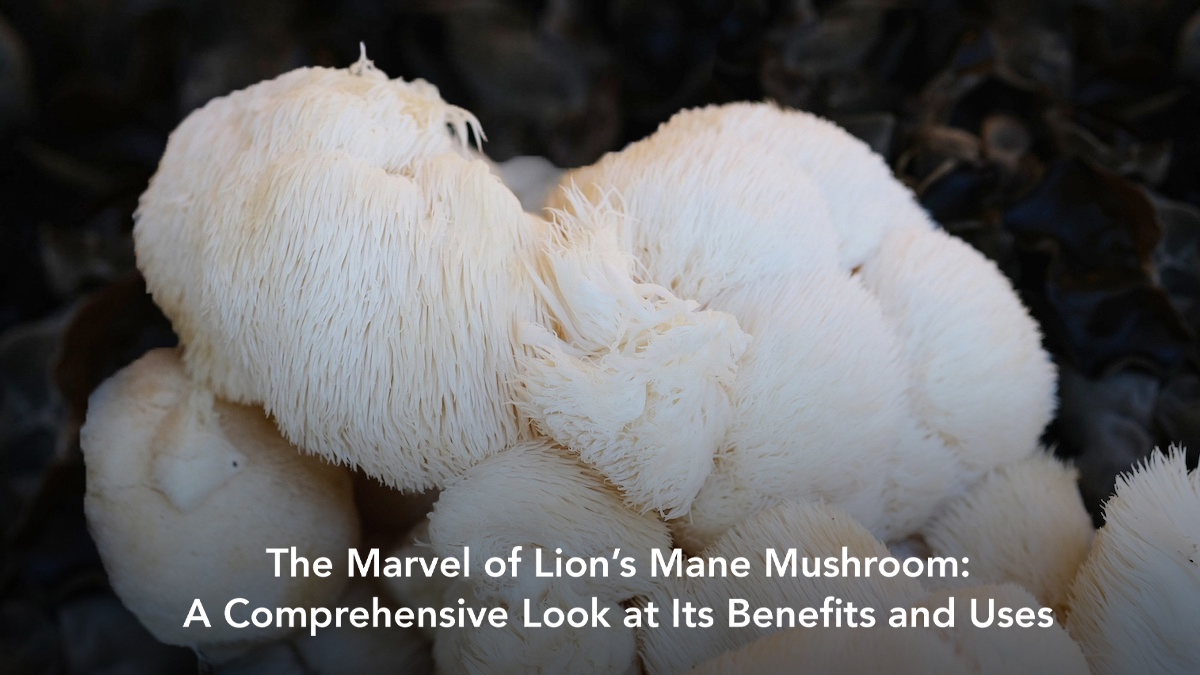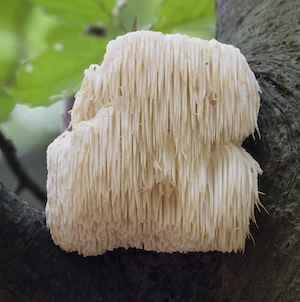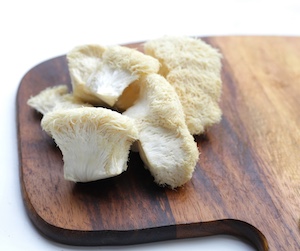The Marvel of Lion’s Mane Mushroom:
A Comprehensive Look at Its Benefits and Uses
By Mark J Kaylor
Lion’s Mane mushroom (Hericium erinaceus) is a fascinating fungus that has captured the attention of researchers, chefs, and health enthusiasts alike. Known for its unique appearance and impressive health benefits, this mushroom has a rich history of traditional use and a growing presence in modern cuisine. In this blog post, we’ll delve into the background of Lion’s Mane, explore its traditional uses, and highlight its culinary applications, all while focusing on the research-based benefits that make it a standout in the world of functional foods.
Background on Lion’s Mane Mushroom
Lion’s Mane mushroom, also known as Yamabushitake in Japan and Hou Tou Gu in China, is easily recognizable by its cascading, icicle-like spines. This mushroom grows on hardwood trees in temperate forests, particularly favoring oak, beech, and maple. It has been used for centuries in traditional Chinese medicine (TCM) and other Asian healing practices, where it is prized for its potential to support cognitive function and overall health.
 Traditional Use of Lion’s Mane
Traditional Use of Lion’s Mane
In traditional Chinese medicine, Lion’s Mane is often used to support digestive health, boost the immune system, and enhance cognitive function. It is believed to have neuroprotective properties, making it a popular choice for those looking to improve memory and mental clarity. Additionally, Lion’s Mane has been used to treat ailments such as stomach ulcers and gastritis, thanks to its anti-inflammatory and antibacterial properties.
Research-Based Benefits of Lion’s Mane
Modern scientific research has begun to validate many of the traditional uses of Lion’s Mane, uncovering a range of potential health benefits. Here are some of the most notable findings:
Cognitive Health: Several studies have shown that Lion’s Mane may support brain health by promoting the production of nerve growth factor (NGF), a protein essential for the growth and maintenance of neurons. A 2009 study published in the journal Phytotherapy Research found that elderly adults with mild cognitive impairment who consumed Lion’s Mane supplements experienced significant improvements in cognitive function compared to a placebo group.
Neuroprotection: Research suggests that Lion’s Mane may help protect against neurodegenerative diseases such as Alzheimer’s and Parkinson’s. A 2016 study in Biomedical Research demonstrated that Lion’s Mane extract could reduce the symptoms of neurodegeneration in mice, potentially due to its antioxidant and anti-inflammatory properties.
Digestive Health: Lion’s Mane has been shown to support gut health by promoting the growth of beneficial gut bacteria and reducing inflammation. A 2013 study in the Journal of Agricultural and Food Chemistry found that Lion’s Mane extract could protect against stomach ulcers in rats, likely due to its ability to inhibit the growth of H. pylori, a bacterium associated with ulcer formation.
Immune Support: The polysaccharides found in Lion’s Mane have been shown to enhance immune function. A 2017 study in the International Journal of Biological Macromolecules reported that these compounds could stimulate the activity of macrophages, a type of white blood cell that plays a crucial role in the immune response.
Anti-Cancer Properties: Preliminary research suggests that Lion’s Mane may have anti-cancer effects. A 2011 study in Food & Function found that Lion’s Mane extract could inhibit the growth of cancer cells in vitro, including those of the stomach, liver, and colon. While more research is needed, these findings are promising
Lion’s Mane in Cooking
Beyond its health benefits, Lion’s Mane is also a versatile and delicious ingredient in the kitchen. Its texture is often compared to that of seafood, particularly crab or lobster, making it a popular choice for vegetarian and vegan dishes. Here are a few ways to incorporate Lion’s Mane into your cooking:
Sautéed Lion’s Mane: Simply sautéing Lion’s Mane in butter or olive oil with a bit of garlic and herbs can bring out its natural umami flavor. This method is quick and easy, making it a great introduction to cooking with this mushroom.
Lion’s Mane “Crab” Cakes: Thanks to its seafood-like texture, Lion’s Mane can be used to create delicious vegetarian “crab” cakes. Combine shredded Lion’s Mane with breadcrumbs, egg, and your favorite seasonings, then pan-fry until golden brown.
Lion’s Mane Soup: Add Lion’s Mane to soups and stews for a hearty, nutritious boost. Its meaty texture holds up well in broths, making it a perfect addition to mushroom or vegetable soups.
Lion’s Mane Tea: For a more traditional approach, try making Lion’s Mane tea. Simply steep dried Lion’s Mane in hot water for a soothing, health-boosting beverage.
Lion’s Mane, Promising Future
Lion’s Mane mushroom is a remarkable fungus with a rich history and a promising future. From its traditional uses in Chinese medicine to its modern applications in cognitive health and culinary arts, this mushroom offers a wealth of benefits that are supported by scientific research. Whether you’re looking to boost your brain health, support your immune system, or simply enjoy a delicious and nutritious meal, Lion’s Mane is a fantastic choice. So why not give it a try and experience the marvel of Lion’s Mane for yourself?

Mark J. Kaylor has been exploring holistic health and healing for close to four decades. He is the founder and director of the not-for-profit Radiant Health Project. Mark welcomes you comments and questions and can be contacted at his website: www.RadiantHealthProject.com or on facebook at www.facebook.com/RadiantHealthProject
Disclaimer: All information and results stated here is for educational and entertainment purposes only. The information mentioned here is not specific medical advice for any individual and is not intended to be used for self-diagnosis or treatment. This content should not substitute medical advice from a health professional. Always consult your health practitioner regarding any health or medical conditions.




